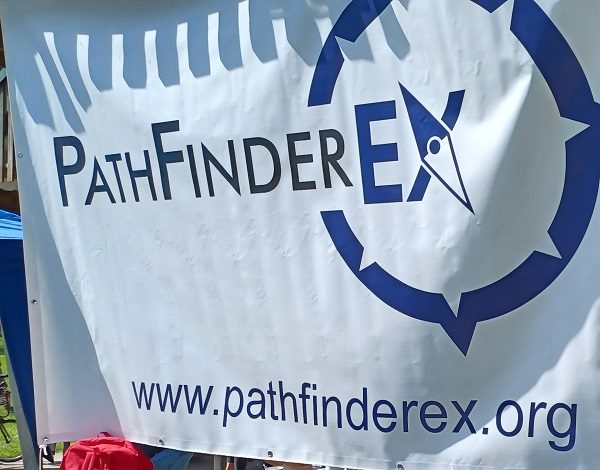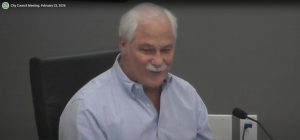Top disaster drill takeaway: Let’s practice more
4 min read
Neighborhood preparedness leaders debrief after the PathFinderEX exercise at Alton Baker Park. Among five participants from Southeast Eugene, David Monk:
[00:00:10] David Monk: Our exercise was damage assessment, so we broke out in groups before that and talked about what kind of information are we looking for, right? Identifying resource skills and what they called ’emergent issues,’ so, emergencies of some sort.
Before we went out on the damage assessment, we were told to wait there until the Communications Team got their act together and conveyed to us how we would be communicating with them, right.
[00:00:38] So I just took that opportunity and there were 10 of us, so I made three teams of three and I said, ‘Who’s going to be the communications person?’ So a volunteer from each group, take the radio. ‘Who’s going to be a scribe?’ And who’s going to be the team leader of that group.
Somebody told me, ‘Why do you have a scribe in each group?’ Well, it turned out, it was really great that we did, because there was a lot of information that wasn’t, like, immediately useful, but clearly once we got together with the other groups, it was useful to others outside the immediate neighborhood we were in.
[00:01:12] I also got lucky that Uli (Reich), who was in my group, he is like Woodburn Fire Department. (He was the one who announced that they do trainings all the time and y’all are welcome to come anytime, we’d love to have you.) And so Uli was my scribe and I gave him my FRS radio to talk to Communications.
[00:01:33] We had two (radios), you know, one was on our area with our Damage Assessment team, and the other one was on Channel Six to talk to Comm. So Uli was facing the Communications team. I was facing the other way. And when they were reporting, I could walk over to Uli with my radio going, and if he was busy, I could take notes.
[00:01:53] I think probably everybody learned a good deal about working in a team, doing assessments. So our team worked, I mean, we had the biggest neighborhood. We have 50 households and we got done well before anybody else, I think, because we had taken that time before we got started. And I don’t think anybody else realized that we should be using this time to organize our group, because otherwise we’re going to be disorganized when we go out there.
[00:02:19] So that worked pretty well for my group, especially since I had an experienced person.
[00:02:25] John Q: Don Metheny was in a different group and had a different experience.
[00:02:29] Don Metheny: Yeah, one of my big lessons learned from this, was that the leadership teams that they formed took, it seemed like, forever to get organized. I was just on a team to go out and do this stuff, and I’m like, ‘Why don’t we just go out and do it?’ ‘Cause I was getting impatient. It takes a while for people to get their act together. Even though they’re there to do it, it took them a while to sort out what they wanted to do, who was going to do what.
[00:02:54] And even then it was hard for the teams to convey what exactly they wanted us to do, when we were supposed to report back, when we returned. They didn’t tell us we were supposed to stay out there. And we had the radios going and we had some trouble with radio communication too. Our leader put his radio under his clipboard to write, and then he couldn’t hear us.
[00:03:18] John Q: With Ready Southeast about to distribute emergency caches, Don recommended hands-on exercises at each neighborhood gathering area.
[00:03:25] Don Metheny: You know, David, the most valuable thing to me that we learned was that we need to practice this. You can’t just do it in your mind and then go there and try to do it. You need to actually get out there and do it, because you learn so much. And the next time you do it, you’re a little better. Then the next time you do it, you’re a whole lot better. And we just need to do the drills and it sinks in and finally people get used to it, they know what to do.
[00:03:52] Doing it for the first time in a group out there, it was tough for some of the people, really tough. And ‘Oh, I don’t know what we’re doing. What are we supposed to be doing? What are we—?’ you know, things like that. But the more you drill this stuff, the better, and the time to drill is now, and those are the most valuable lessons I learned. We need to do more of those.
[00:04:12] David Monk: I agree.
[00:04:12] John Q: David Monk said he hopes to improve in matching needs and resources in real time.
[00:04:17] David Monk: In my group, our damage assessment (we’ve all lost power of course), probably one of the first reports was somebody had a little generator and gasoline and then three blocks over, say five or 10 minutes later, somebody says, ‘I have this medical device that allows me to breathe and if I don’t have it within short order, I’m going to be in trouble.’ As the team leader, I should have been matching those up as soon as I heard about that distressed person needing electricity.
[00:04:49] So, yeah, I think we should do at least two a year, every year. And then maybe we do a city-wide with the CERT program. And we do one neighborhood-specific training exercise of some sort.
[00:05:02] John Q: Ready SE leaders review the recent field exercise to see where they can improve. Nearby neighbors can find group discussion exercises at WholeCommunitySupport.org, or contact your local neighborhood association.







